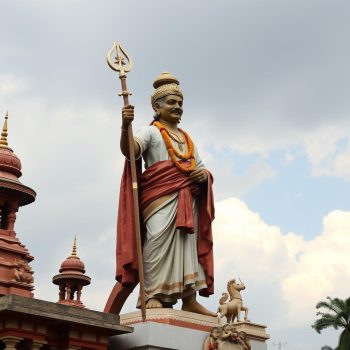SSLC English Question and Answer: Vachana
Looking for SSLC English Studies textbook answers? You can download Chapter 3: Vachana Questions and Answers PDF, Notes, and Summary here. SSLC English 1st Language solutions follow the Karnataka State Board Syllabus, making it easier for students to revise and score higher in exams.
Karnataka SSLC English Textbook Answers—Reflections Poem 3
Vachana Questions and Answers, Notes, and Summary
Class 10 English Poem Chapter 3
Vachana
Scroll Down to Download Vachana PDF
Comprehension I: Vachana
Question 1.
The line’s The rich / will make a temple for Siva’, implies that
a. they want to please the Lord.
b. they can afford to build temples
c. they believe that this is how they can serve God
d. they believe that the temple is the only place to feel the presence of God.
Answer:
(c) they believe that this is how they can serve God.
Question 2.
Which of the following statements is true?
a. the speaker is against building any structures for worshipping God
b. it’s not possible for the speaker to build a temple.
c. it’s only an excuse given by the speaker for not being able to build a temple.
d. the speaker believes that God is present within ourselves and not in any temple.
Answer:
(d) the speaker believes that God is present within ourselves and not in any temple.
Question 3.
What are the feelings of the speaker, suggested in the question, “What shall I, a poor man, do?”
a. helplessness
b. doubt
c. humility
d. anger
e. pride
f. anguish.
Answer:
(f) anguish
Question 4.
The word ‘Listen’ in the last stanza is
a. an order
b. an appeal
c. a request
d. an advice
Answer:
(d) an advice
Question 5.
The expression Things Standing’, suggests
a. any man-made temple
b. anybody who is standing
c. anything static
d. the human body
Answer:
(c) anything static.
Question 6.
There are two examples of paradox in the last two lines (A paradox is a statement containing opposite ideas.)
a) What opposite ideas are suggested in ‘things standing shall fall’?
Answer:
Things standing shall fall’ can be interpreted in various ways. The poet laments his inability to build temples; hence, the phrase can refer to temples which are subject to nature’s fury and destruction over a period of time. It can also refer to pride and arrogance, which can make a person stand erect in front of God when he should be bowing before Him.
It may also mean that static objects that are moved by piety and devotion are subject to destruction and decay, while the heart that is filled with devotion is blessed and becomes immortal.
b) What opposite ideas are suggested in ‘the moving shall ever stay’?
Answer:
The moving shall ever stay’ —this phrase too can be interpreted in many ways. The ‘moving,’ i.e., the human heart, which is a ‘moving temple,’ cannot be destroyed by nature’s fury unlike a temple that can be damaged easily by nature; the ‘moving’ can also refer to humble beings who are swayed by devotion and move according to God’s will, unlike the ‘static’ that stand erect against God’s wishes and get destroyed.
Question 7.
What final message do the last two lines convey?
Answer:
The poet is consoling himself that the temple, which he would never be able to construct, would any day be destroyed, whereas the ‘moving temple’ that he carries in his heart would be immortal and intact. The lines can also mean that the one who ‘stands’ in front of God without bowing down to Him will surely ‘fall’ or be destroyed, whereas ‘the moving,’ the one who bows down in front of Him and acts according to His wish, would stay forever. The poet finds consolation in his modest circumstances and his devotion to God.
Comprehension II: Vachana
Question 1.
How is the human body compared to a temple?
Answer:
The whole body is compared to a temple, with the legs being pillars, the body the shrine with the idol of God secure in the heart, and the head, a cupola of gold with serene thoughts protecting the God in the heart.
Question 2.
What is the figure of speech used here?
Answer:
The figure of speech used here is a metaphor.
Question 3.
Why is the speaker comparing the human body to a temple?
Answer:
The speaker wanted to construct a temple like the rich people do and thereby please God, but he is very poor and cannot do so. Hence, he decides to treat his own body as a temple with God secure in his heart. He also realizes that the temple built of brick and stone can be damaged by nature one day, whereas the ‘moving temple’ in his heart can never be.
Comprehension III: Vachana
Question 1.
What ideas of spirituality emerged from the study of this well-known Vachana?
Answer:
- Building temples for Siva is considered a good way to please the Lord.
- However, not everyone can build temples.
- Temples built of stone and brick can be destroyed.
- God is found not just in temples but also outside.
- Carrying God in one’s own heart is the best way of worshipping Him.
- This ‘moving temple’ cannot be destroyed at all.
In this poem, Basavanna tells us that a rich man can afford to build grand temples in honor of gods, but a poor man can’t. However, with is devotion, i.e., with pure thoughts, actions and deeds, he can turn his body into a temple. He may offer his legs for pillars, his body for a shrine, and his head for a cupola. A temple of faith is immortal as human beings live on generation after generation, but a temple of stone will perish sooner or later.
With this analogy, the lyricist is telling us that faith in the heart is more important than cold stone structures dedicated to a God. To him, true faith is more important than a display of wealth by the rich who put up such structures.
Vachana Poem Summary
This vachana encapsulates the essence of Veerashaivism which revolted against idol worship and the building of temples which people from certain sections of society could not enter. It was also a revolt against the caste system which laid down that only some people could ever hope to ‘realize’ God or find salvation through following the paths of jnana. bhakti or karma (knowledge, devotion or duty). The ‘others’ could only hope to serve the ‘upper’ classes dutifully.
Here the poet wants to please God by building temples for Him like the rich people do, but doesn’t have the resources to do so. Hence he dedicates himself to the service of God by treating his legs as the pillars of the temple, his body the holy shrine, his head the cupola or the golden dome of the temple.
Since he is not allowed to worship in the temples, he decides to worship the Lord in his own – heart and yield to His every wish. He declares that he will move (or obey) the commands of the Lord because that is the way in which he can be closest to the Lord. ‘Things standing shall fall’ refers to the temples which can be destroyed by earthquakes, floods or the wind, whereas the heart filled with devotion towards the lord shall ever stay immortal.

